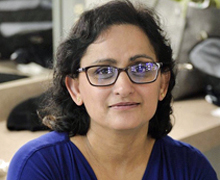Platform for Rapid Immuno-oncology Target Validation
Rapidly measuring effects of T cell function modulators on anti-cancer activity with gene-edited mouse models
Technology Overview
 Dr. Vandana Kalia
Dr. Vandana Kalia Dr. Surojit Sarkar
Dr. Surojit Sarkar
Checkpoint blockade immunotherapy, for example with antibodies against CTLA-4 or PD-L1, spurs antitumor T cell activity to produce dramatic regression in some cancer patients. However, clinical response to checkpoint blockade is as low as 10%, with the treatment having little or no effect on some cancers.
Drs. Surojit Sarkar and Vandana Kalia are working to reduce response variability and expand immunotherapy effectiveness to more patients and cancer types. One approach is identifying drugs that synergize with checkpoint blockade for effective combination immunotherapy. Another approach is finding new monotherapies that target the effector T cells that are primarily responsible for positive responses.
Omics analyses have identified thousands of genes that are potential targets for new drugs to improve responses to checkpoint blockade and other immunotherapies. However, screening each gene for in vivo immune system effects, efficacy against specific cancers, and potential toxicities is expensive and time-consuming.
Drs. Kalia and Sarkar developed a platform for screening genes that are targets of new immunotherapy drugs. The main advantages of the platform are its cost, which can be up to 10-times lower than other strategies, and its speed, with results delivered in months instead of years.
The key element of the platform is a high-throughput pipeline for targeted CRISPR-Cas9 knockout of genes in mouse T cells. Gene deletions are validated and in vitro cell phenotypes and toxicities are determined using rapid in vitro methods for gene expression and cell function and activity. Next, adoptive T cell transfer techniques introduce the knockout T cells into mice carrying mouse tumors whose response to therapy mimics human cancers. Results from in vivo assays predict the efficacy of gene knockout or knockdown, potential toxicities, and synergy with existing drugs.
The platform from the Sarkar and Kalia labs is faster and less expensive than methods that require making knockout mice and has more direct biological relevance compared to in vitro analyses. It has multiple applications including developing and validating drugs for autoimmune and infectious diseases. Drs. Kalia and Sarkar are interested in partnerships that use their drug-validation platform to develop new monotherapies or medicines that complement existing immunotherapies.
Stage of Development
-
Preclinical in vivo
Partnering Opportunities
- Collaborative research opportunity
- Sponsored research agreement
- Consultation agreement
- Licensing agreement
- High-throughput screening
Publications
- Sarkar S, Yuzefpolskiy Y, Xiao H, Baumann FM, Yim S, Lee DJ, Schenten D, Kalia V. Programming of CD8 T cell quantity and polyfunctionality by direct IL-1 signals. J Immunol. 2018;201(12):3641-3650.
- Kalia V, Penny LA, Yuzefpolskiy Y, Baumann FM, Sarkar S. Quiescence of memory CD8+ T cells is mediated by regulatory T cells through inhibitory receptor CTLA-4. Immunity. 2015;42(6):1116-1129.
- Kalia V, Sarkar S.Antigen-addicted T cell reserves trickle charge the frontline killers. Immunity. 2016;19;45(1):10-12.
- Yuzefpolskiy Y, Baumann FM, Kalia V, Sarkar S. Early CD8 T-cell memory precursors and terminal effectors exhibit equipotent in vivo degranulation. Cell Mol Immunol. 2015;12(4):400-408.
- Xia M, Hu S, Fu Y, Jin W, Yi Q, Matsui Y, Yang J, McDowell MA, Sarkar S, Kalia V, Xiong N. CCR10 regulates balanced maintenance and function of resident regulatory and effector T cells to promote immune homeostasis in the skin. J Allergy Clin Immunol. 2014;134(3):634-644.
- Kalia V, Sarkar S, Subramaniam S, Haining WN, Smith KA, Ahmed R. Prolonged interleukin-2Rα expression on virus-specific CD8+ T cells favors terminal-effector differentiation in vivo, Immunity. 2010;32(1):91-103.
Learn More
To learn more about partnering with Seattle Children’s Research Institute on this or other projects, email the Office of Science-Industry Partnerships.
